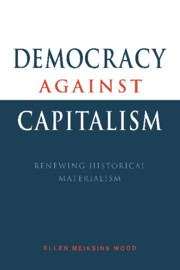Book contents
- Frontmatter
- Contents
- Acknowledgements
- Introduction
- I HISTORICAL MATERIALISM AND THE SPECIFICITY OF CAPITALISM
- 1 The separation of the ‘economic’ and the ‘political’ in capitalism
- 2 Rethinking base and superstructure
- 3 Class as process and relationship
- 4 History or technological determinism?
- 5 History or teleology? Marx versus Weber
- II DEMOCRACY AGAINST CAPITALISM
- Conclusion
- Index
1 - The separation of the ‘economic’ and the ‘political’ in capitalism
Published online by Cambridge University Press: 13 October 2009
- Frontmatter
- Contents
- Acknowledgements
- Introduction
- I HISTORICAL MATERIALISM AND THE SPECIFICITY OF CAPITALISM
- 1 The separation of the ‘economic’ and the ‘political’ in capitalism
- 2 Rethinking base and superstructure
- 3 Class as process and relationship
- 4 History or technological determinism?
- 5 History or teleology? Marx versus Weber
- II DEMOCRACY AGAINST CAPITALISM
- Conclusion
- Index
Summary
The original intention of historical materialism was to provide a theoretical foundation for interpreting the world in order to change it. This was not an empty slogan. It had a very precise meaning. It meant that Marxism sought a particular kind of knowledge, uniquely capable of illuminating the principles of historical movement and, at least implicitly, the points at which political action could most effectively intervene. This is not to say that the object of Marxist theory was to discover a ‘scientific’ programme or technique of political action. Instead, the purpose was to provide a mode of analysis especially well equipped to explore the terrain on which political action must take place.
Marxism since Marx has often lost sight of his theoretical project and its quintessentially political character. In particular, there has been a tendency to perpetuate the rigid conceptual separation of the ‘economic’ and the ‘political’ which has served capitalist ideology so well ever since the classical economists discovered the ‘economy’ in the abstract and began emptying capitalism of its social and political content.
These conceptual devices do reflect, if only in a distorting mirror, a historical reality specific to capitalism, a real differentiation of the ‘economy’; and it may be possible to reformulate them so that they illuminate more than they obscure, by reexamining the historical conditions that made such conceptions possible and plausible. The purpose of this reexamination would not be to explain away the ‘fragmentation ’ of social life in capitalism, but to understand exactly what it is in the historical nature of capitalism that appears as a differentiation of ‘spheres’, especially the ‘economic’ and the ‘political’.
- Type
- Chapter
- Information
- Democracy against CapitalismRenewing Historical Materialism, pp. 19 - 48Publisher: Cambridge University PressPrint publication year: 1995
- 21
- Cited by



